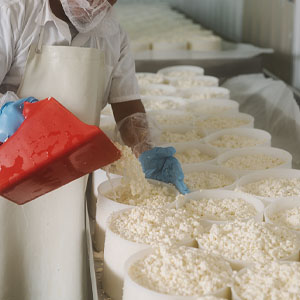Georgia’s Sweet Grass Dairy

At Thomasville, GA’s Sweet Grass Dairy, it’s the bovines that set its cheese apart.
The operation is owned by the husband and wife duo of Jeremy and Jessica Little, who together run the cheese production facility as well as a cheese shop and restaurant. Jeremy serves as head cheesemaker and focuses more on operations, while Jessica manages sales, marketing and the cheese shop. However, their jobs often overlap, and they wear many hats.
To fully understand the history of Sweet Grass Dairy, you first need to harken back to the story of Jessica’s parents—Al and Desiree Wehner. These dairy farmers switched their farming method to an intensive grazing management farming style in 1993, allowing “cows to be cows”. This meant the animals were moved to a fresh pasture every 12 hours and kept cool under a large pivot system.
It was this farming style, combined with the natural resources and mild winters in South Georgia, that helped the cows live longer, healthier lives on fresh green grass 365 days per year.
“My dad is from a long line of dairy farmers, and I grew up in 4H showing cows, but I told my parents I would never come back to South Georgia once I went to college,” Jessica says. “But never say never. While I was in school, I met Jeremy, and we both loved food so much, we thought it was our career path.”
While the couple lived in Atlanta, Jessica’s mom had the idea to start making cheese in her kitchen back on the farm.
“I would come home from school and taste what was in the beginning not great, but she kept at it, and people were so excited about it,” she explains. “We saw quickly this would be a fun opportunity and encouraged her to keep going.”
The Wehners built the creamery and, within a year, they needed help and interviewed some French cheesemakers to possibly come aboard. But Jeremy thought it would be a good idea for him and Jessica to move to Sweet Grass and help out.
“He fell in love with the idea of learning about the origins of food,” Jessica says. “For so long, he thought really great food was all about the skill of the chef and the technique. But he learned from coming to the farm that putting the care into the grass and the soil and how doing such a good job with the cows all play a role. There’s so much more than technique; it’s about sourcing great ingredients and high-quality food stock.”
The Littles moved back and quickly fell in love with the cheese industry, buying the creamery from Jessica’s parents back in 2005.
In Charge
With the Littles now running things, they soon learned that cheesemaking required a lot of time and dedication. Fortunately, the couple was willing to do what they could to make the operation a success.
“Being entrepreneurs at a young age was tough,” Jessica says. “When we bought the creamery, it was 140 acres and making both cow and goat milk. We found that it was really hard to be great farmers, maintain the pasture and be great at animal husbandry, along with making the cheese and marketing and selling it.”
At the time, the couple was driving three to four hours to farmers markets and taking the cheese around to chefs. They found it difficult to manage everything.
“We ended up selling the goats after about five years, which was a really hard decision,” Jessica says. “I think it made us better because we were able to focus on one segment—cow milk cheeses.”
That extra time also afforded them the opportunity to open up a cheese shop and restaurant in their home town.
“We were getting so disconnected because we were selling all our cheese far away, but we didn’t have a good pulse of what customers were interested in once we stopped doing farmers markets,” she says. “We wanted that connection with the consumer, and this has allowed us to get involved with the community and see what they like and want.”
For instance, recently Sweet Grass Dairy launched a new Gouda, and they offered it at the cheese shop first to see the response on a larger scale.
“We traded one headache of running a goat farm with another of running a restaurant, but it was a good move for us,” Jessica says. “We’re now a jack of all trades as opposed to being a master of one, and I think with COVID-19, we’re very thankful we are. We have many different areas of of business.”
Evolution of Success
When the Littles first moved back to the farm, they attended their first American Cheese Society conference in 2002, and Sweet Grass Dairy won five different awards for cheeses.
“We were sitting right in front of a really great cheesemaker named Liz Parnell who had a creamery in Huntsville, AL, and she turned around, then looked at us and said, ‘Now I know I need to retire; when someone who has only been making cheese for two years is now winning awards.’ We have been very fortunate to win awards along the way.”
The company’s most popular cheese is its award-winning Green Hill, a double cream, soft-ripened cow’s milk cheese made in the style of a Camembert, named after its flagship dairy. It has an unctuous, buttery flavor, a thin white bloomy rind and smooth, creamy texture, perfect atop a warm baguette.
“This has helped put us on the map on a larger scale,” Jessica says. “We’ve had some success with our natural rind Asher Blue, which has won awards, as well.”
The Littles’ quest for education in the industry has been a key to success, she adds. Jeremy has spent a great deal of time at different institutions learning more about cheese and the process and has become friends with many in the cheese world.
“Our industry is not uber competitive, and we can pick up the phone and ask someone for help and learn,” Jessica says. “For me, that kind of collaboration is notable.”
Farming Matters
The thing that distinguishes Sweet Grass Dairy from other cheese companies is the way that they farm.
“We live in an area that has very mild winters, and we can keep our cows on grass year-round,” Jessica says. “Throughout cheese history, it’s known that when cows are out on grass, the flavor of the milk has been great. So we can provide a flavor profile that most other areas of the country don’t have.”
The average temperature annually is 67 degrees. In addition, the farm has unlimited water as it sits on top of the second largest aqua in the nation, so they can grow grass every single day.
“What we are doing with the land matters, and to be able to tell the story and to taste the difference is important,” Jessica says. “We are providing sustainable business for the long-term.”
It’s All About the Cheese
In addition to Green Hill, the other cheese in Sweet Grass Dairy’s portfolio that the company is known for is its Thomasville Tomme, a French table cheese made in the style of a Pyrenees mountain farmhouse tomme. This natural rinded, semi-soft cheese is aged for 60 to 90 days, which imparts a subtle yet complex earthy flavor and creamy texture.
She calls this a good gateway cheese for a lot of people in the region, and it attracts people to artisan cheese and trying more of its flavors.
“Most of the cheeses we make are French-inspired because Jeremy learned how to make cheese from a French cheesemaker at the very beginning, and there’s so much information and recipes that we can pull ideas from,” Jessica says. “He’ll say these are old-world-inspired flavors but with new-world type flavors.”
Every cheesemaker has a cheese that changed their lives, and for Jeremy, it was blue cheese, which is why Asher Blue is one of his favorites. This is described as having a unique natural rind and creamy-crumbly texture. It is slightly pungent, with a mushroomy aroma and earthy, grassy flavors with an unexpectedly mild, salty finish.
“It’s one of the hardest cheeses to make, but he loves making it, and it keeps him excited about this business,” Jessica says. “I love how cheese brings joy to people’s lives. It’s been so fun to be part of an industry that hasn’t had a lot of history in our country, and we both enjoy being a part of that.”
Looking Ahead
Sweet Grass has roughly 50 employees, with about half working at the restaurant. There’s also a marketing manager who lives in Atlanta and a national sales director in San Francisco. Everyone else is in the creamery or cheese shop.
“Last year, we made about 380,000 pounds of cheese, but we’re still small, and in that difficult phase of being too big to be small, but not yet competing on a national scale,” Jessica says. “We need to scale up and hire people who are experts in the years ahead.”
The plan is to move into a new facility sometime in 2020. The goal is to produce roughly five times its current capacity in the next few years and add new cheeses to its portfolio.
With the coronavirus impacting so many things this year, 2020 has been an odd year for Sweet Grass Dairy, as the company has experienced the same challenges all retailers and restaurants have. “We have some equipment coming from Canada and France, and we’re not sure when the borders will be open, but we are primed and ready to be in the new production facility in August. This will allow us to bump up to the next level and hire a really great controller and a really great production manager,” Jessica says. “We will be focusing on getting to that next level.”


